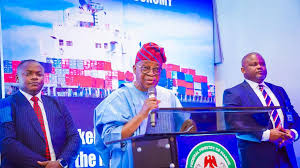The Minister of Marine and Blue Economy, Gboyega Oyetola, has unveiled a national policy on Marine and Blue Economy to industry stakeholders while seeking their collaboration to enhance the productivity and efficiency of the sector. The policy document is a comprehensive statement by the government designed to identify the challenges hampering the growth of the industry to proffer actionable solutions.
He interacted with the stakeholders on the policy at a two-day validation workshop in Lagos, which opened on Tuesday. The 57-page draft document confronts challenges such as illegal fishing, boat mishaps on the nation’s waterways, and environmental degradation and tries to proffer solutions.
The consultations with key stakeholders nationwide are part of the Ministry’s efforts to develop a comprehensive National Policy, to establish a sustainable framework that fosters economic growth through the responsible management of marine and blue resources, to guarantee that exploits in the sector align with global best practices and contributes to Nigeria’s development objectives.
In the Minister’s words: “For Nigeria, with over 853 kilometers of coastline, extensive inland waterways, and a vast exclusive economic zone, the marine environment holds unparalleled opportunities. These range from fisheries and aquaculture to shipping, tourism, and renewable energy. However, these opportunities come with challenges: unsustainable practices, environmental degradation, and illegal activities, such as Illegal, Unreported, and Unregulated (IUU) fishing.
“A robust National Policy will ensure that we address these issues through a comprehensive framework that aligns with international best practices while safeguarding our marine resources for future generations. This validation workshop is a milestone in our efforts to elevate Nigeria’s marine and blue economy. It is a product of diligent and inclusive policymaking that underscores our Ministry’s commitment to collaboration and precision.
“The Federal Ministry of Marine & Blue Economy has painstakingly developed strategies to guide the sustainable use of our marine resources. These efforts, supported by partnerships with the African Union Inter-African Bureau for Animal Resources (AU-IBAR) and other stakeholders, include the finalization of policies on fisheries and aquaculture in collaboration with WorldFish. These critical contributions are vital inputs into the National Policy on Marine & Blue Economy.
“At the end of this process, we expect to deliver a national policy document that sets out the roadmap to developing our blue economy, creating jobs, promoting private sector investments, and delivering inclusive prosperity to all Nigerians, especially for our youths and women,” he said.
“This workshop is therefore a call to duty to refine and validate the propositions and set the stage for our collective success. As we deliberate, let us embrace open and constructive dialogue. Your insights and expertise are vital for shaping a national policy that addresses critical issues such as safety, security, and sustainability in Nigeria’s marine and blue economy,” the Minister said.
“Nigeria has achieved notable progress in maritime governance, including the ratification and domestication of international protocols and conventions. These measures have strengthened our safety and security framework, resulting in a remarkable three-year period of zero incidences of piracy in our waters.
“Nonetheless, the recurring spate of boat mishaps underscores the pressing need for immediate action. This policy seeks to implement comprehensive strategies to ensure the safety of all waterways. However, challenges such as the spate of boat mishaps demand urgent attention, and this policy aims to establish comprehensive measures to enhance safety across our waterways.
“As we develop this policy, the Ministry remains committed to repositioning Nigeria as a dominant player in the marine and blue economy both regionally and globally. We are also pursuing Nigeria’s candidacy for election into Category C of the International Maritime Organization (IMO), which underscores our determination to strengthen our voice in global maritime governance.
“Additionally, we are actively seeking private sector investment for port modernization, which is critical for boosting Nigeria’s competitiveness and attracting sustainable funding for the sector. These efforts are integral to ensuring that our policies translate into tangible progress and measurable outcomes”.
Acknowledging that a lot of effort by various consultations and technical drafting had gone into the making of the policy document Alhaji Oyetola, however, sought the support and commitment of critical stakeholders in the maritime industry to make it work. “This validation workshop represents the culmination of those efforts.
“Our goal today and in the coming days is to critically evaluate the policy, ensuring that it addresses the needs of all stakeholders, incorporates global standards, and positions Nigeria as a regional leader in the blue economy.
The two-day validation workshop brought together critical stakeholders, technocrats, experts on marine and blue economy heads of government agencies, and Directors of the ministry who are expected to brainstorm on the 57-page draft document to enhance service delivery in the sector and enhance its growth.
Commendation for Oyetola and Tinubu
The Permanent Secretary of the Ministry, Mr. Olufemi Oloruntola, commended the minister’s dedication to shaping the policy as a framework that offers stakeholders an opportunity to review and contribute towards its refinement. He noted that the presence of diverse stakeholders highlights the collective effort required to advance the marine and blue economy for national growth. He was optimistic that the outcome of the workshop would provide a clear roadmap for sustainable development, describing the initiative as a collaborative milestone.
Some stakeholders at the workshop commended President Bola Tinubu for his Renewed Hope Agenda in establishing the ministry to unlock the country’s marine potential for economic development. The Secretary-General, of the African Shipowners Association, Ms. Funmi Folorunsho, noted that engagement with stakeholders is vital to formulating government policies.
The finalized policy would set the roadmap for sustainable development, promote private-sector participation, and reposition Nigeria as a dominant player in the global marine economy.


More Stories
Transforming NIMASA: Mobereola’s First Year
Mobereola’s One Year of Momentous, Result-Orientated Leadership at NIMASA
NIMASA, NDLEA Deepen Partnership Against Drug Abuse